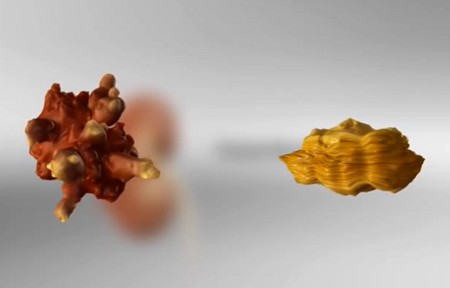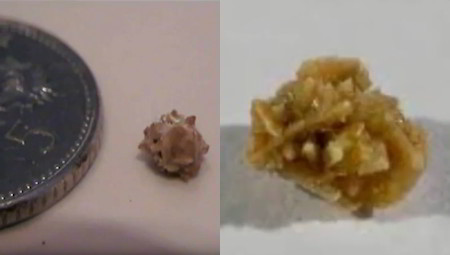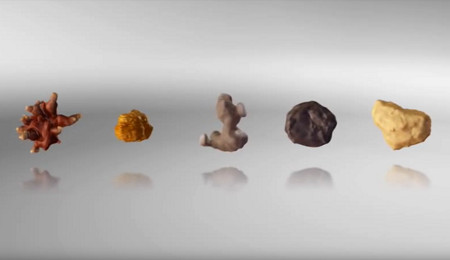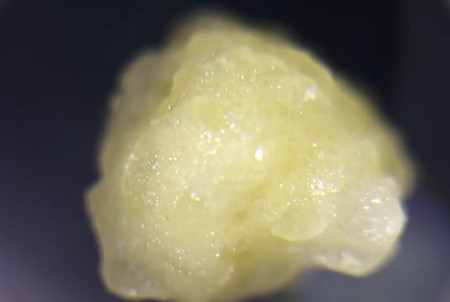Kidney Stones (Urolithiasis): Overview
Alternative names: Urolithiasis, Nephrolithiasis
Kidney stones are painful urinary disorders that start as salt/chemical crystals which precipitate out from urine. Tiny crystals will pass out along with the urinary flow without causing problems. At least 1% of people will pass a kidney stone during their lifetime, producing some of the most severe pain possible.
- check your overall health status
- identify any nutritional deficiencies
- learn what you should be doing right now
Kidney stones may contain various forms of salts – the most common is calcium in combination with either phosphate or oxalate. These salts are an essential part of our daily dietary intake and requirement. Other types of stones are the struvite stone (caused by infection), uric acid stone and cystine stone.
Incidence; Causes and Development; Contributing Risk Factors
In the U.S. it is estimated that 13% of men and 7% of women will develop a kidney stone during their lifetime. Fortunately, in about 78% of cases, stones are passed without surgical intervention.

The reasons why some people develop kidney stones are not fully understood. Aside from more obvious risk factors, metabolic conditions e.g. hyperparathyroidism, cystinuria (inherited disease), and hyperoxaluria (inherited disease) are also common causes of stone formation.
The driving force behind crystallization and hence stone formation is supersaturation of the urine with stone-forming salts such as calcium oxalate, uric acid, calcium phosphate. In undersaturated urine, crystals cannot form. This is why dehydration is a major cause of kidney stone formation.
Another important factor in crystal formation is a deficiency in substances called inhibitors. Inhibitors prevent crystal formation by slowing down the nucleation, growth and aggregation process. They do this by binding with ions that are needed for crystal formation and growth. These inhibitors include citrate, pyrophosphate, and magnesium and this is why, for example, potassium citrate tablets are prescribed to those with kidney stones.

Stone formers often suffer from a variety of metabolic disturbances that increase the amount of stone-forming substances that are excreted in the urine, and also decrease the excretion of inhibitors.
Nutritional factors, such as a diet high in sodium, increase risk of kidney stone formation. Sodium increases calcium excretion AND reduces urinary levels of stone-inhibiting citrate. Similarly, too much animal protein increases uric acid levels in the urine and reduces urinary citrate levels.
Environmental factors such as inadequate fluid intake also play a role in increasing risk of stone formation. Those living in areas with high temperatures and high humidity are at increased risk.
Certain minerals, vitamins, and medications also increase risk. These include calcium, vitamin C, and vitamin D.
Diagnosis and Tests

Most kidney stones contain crystals of multiple types. However, usually one type predominates, and determining the type helps to identify the underlying cause:
- Calcium stones are the most common type is usually in the form of calcium oxalate, and makes up 4 out of 5 cases. Oxalate is found in some fruits and vegetables, but the liver produces most of it. Avoiding foods rich in oxalates, such as dark green vegetables, nuts and chocolate.
- Struvite stones are found more often in women, and are almost always the result of urinary tract infections.
- Uric acid stones are a byproduct of protein metabolism, commonly seen alongside gout.
- Cystine stones make up a very small percentage of kidney stones. They are the result of a hereditary disorder that causes your kidneys to excrete massive amounts of certain amino acids.
Treatment and Prevention
There is no cure for kidney stones as such, but once an acute episode has been resolved the solution is simple: prevent recurrence.

Stones that become lodged in the ureter may require surgical procedures such as lithotripsy or endoscopic removal.
The most common types of stones, namely those formed from calcium oxalate and calcium phosphate, can be easily managed with a combination of diet and lifestyle changes, and medication. Recommendations include:
- Increase fluid intake
- Increase citrus consumption
- Moderate calcium consumption
- Limit stone-inducing drugs
- Limit dietary oxalate and sodium
- Avoid consuming excess animal protein
Diuretics and potassium citrate are often very effective at preventing stone formation.
Prognosis
Nearly half of all first time stone formers will have another episode within the first 4 years, and recurrent stone formers may form a new stone every 2 or 3 years.
Signs, symptoms & indicators of Kidney Stones (Urolithiasis):
Symptoms - Abdomen
 Moderate/significant/severe hypogastric pain or mild hypogastric discomfort
Moderate/significant/severe hypogastric pain or mild hypogastric discomfort
Kidney stones are characterized by (often extreme) pain at the site where the stone is causing irritation i.e. back and sides of the abdomen, lower front of the abdomen and groin area.
Symptoms - Metabolic
Symptoms - Sleep
Symptoms - Urinary
 (Recent onset) blood in urine
(Recent onset) blood in urine
The bleeding may be caused by abrasion along the urinary tract as the stone travels.
 (Slightly/very) painful urination
(Slightly/very) painful urination
Painful and/or difficult urination is a common sign of a kidney stone.
Risk factors for Kidney Stones (Urolithiasis):
Autoimmune
Diet
 Excess Protein Consumption
Excess Protein Consumption
High protein intakes may lead to loss of calcium, leading in turn to the development of kidney stones.
Digestion
 Ulcerative Colitis
Ulcerative Colitis
When the immune system triggers inflammation in other parts of the body because of ulcerative colitis, kidney stones may result. This influence is usually mild and stones may not be a problem once the colitis is treated.
Family History
Glandular
 Hyperparathyroidism
Hyperparathyroidism
Increased calcium and phosphorous excretion in the urine may cause kidney stones.
Supplements, Medications, Drugs
 (Discontinued) diuretic use
(Discontinued) diuretic use
Excessive intake of diuretics may give rise to excess calcium in the urine.
 Much vitamin D supplementation
Much vitamin D supplementation
Excessive intake of vitamin D may give rise to excess calcium in the urine.
Symptoms - Food - Beverages
Symptoms - Food - General
 Long-term/short-term low-carb dieting or discontinued low-carb diet
Long-term/short-term low-carb dieting or discontinued low-carb diet
The American Academy of Family Physicians notes that high animal protein intake is largely responsible for the high prevalence of kidney stones in the United States, which can cause severe pain or even urinary obstruction and kidney damage. Plant protein did not seem to have a harmful effect. [American Family Physician 60 (1999): p.2269]
Symptoms - Muscular
 Having excess body fat
Having excess body fat
Many overweight people regularly need to deal with passing, breaking up, or surgically removing kidney or gall stones.
 Being very skinny or being lean or underweight
Being very skinny or being lean or underweight
Many overweight people regularly need to deal with passing, breaking up, or surgically removing kidney or gall stones.
Symptoms - Urinary
Kidney Stones (Urolithiasis) suggests the following may be present:
Nutrients
 Potassium Need
Potassium Need
When potassium levels fall too low, urine citrate also drops, decreasing your protection against stones.
Kidney Stones (Urolithiasis) can lead to:
Musculo-Skeletal
Organ Health
 Kidney Disease
Kidney Disease
A kidney stone that is obstructing will cause damage to the kidneys in the long run if left untreated and may even lead to end stage kidney failure. Anyone with a past history of kidney stones should have regular screening performed as the recurrence rate is high.
Sleep
Recommendations for Kidney Stones (Urolithiasis):
Botanical / Herbal
 Hydrangea
Hydrangea
A Dr. Scudder, writing in 1874, wrote: "[Hydrangea] is a valuable remedy in diseases of urinary apparatus. It gives tone to the kidneys, improving their functional activity, and thus tends to arrest the formation of urinary deposits and calculi. It relieves irritation of the bladder and urethra and hence proves serviceable in cases of gravel."
A Dr. Ellingwood wrote, in 1905: "About the year 1830 experiments were conducted to prove [Hydrangea's] influence in relieving pain caused by the presence and passage of urinary calculi, and favorable reports were made of its direct usefulness. Its influence controlled the pain in a satisfactory manner, relieved general distress, and soothed irritation."
Diet
 Increased Water Consumption
Increased Water Consumption
Prevention is very important especially in those with a high likelihood of developing this condition since the recurrence rate of stone formation is very high. Drinking a lot of water is the best preventative measure: drink enough to produce approximately 2 liters (one-half gallon) of urine per day. Adequate fluid intake helps prevent kidney stone problems by allowing most small stones to pass through.
 Dairy Products Avoidance
Dairy Products Avoidance
Those with a tendency to form calcium stones may want to avoid foods rich in calcium, such as dairy products.
 Caffeine/Coffee Avoidance
Caffeine/Coffee Avoidance
A study published September, 2004 in the journal Urology suggests people prone to kidney stones should limit their intake of caffeine and cut down on the amount of coffee they drink. People who consumed caffeine in amounts equal to two cups of coffee showed elevated levels of calcium in their urine, which can increase the risk of developing stones, especially for people prone to stones. "Caffeine consumption may modestly increase risk of calcium oxalate stone formation," concluded the researchers.
 Oxalate Avoidance
Oxalate Avoidance
Those prone to getting calcium oxalate stones are advised to avoid the consumption of foods high in oxalates.
Drug
 Conventional Drug Use
Conventional Drug Use
For prevention of stone formation, medical therapy is available for those with known predisposing conditions. For those with stones, pain-killers (as prescribed by a doctor) can provide great relief. In addition, some medications may help break down larger stones.
 Diuretics
Diuretics
Thiazides lower urinary calcium excretion, which helps prevent calcium-based kidney stone formation.
Invasive / Surgery
 Surgery
Surgery
Surgical intervention – cystoscope or open surgery – may be required if other physical intervention, such as shockwave therapy (F-SWL) to break up stone(s) is unsuccessful.
Mineral
 Magnesium
Magnesium
By increasing calcium solubility (especially in the urine) and reducing calcium absorption, magnesium can help prevent kidney stones, especially those composed of calcium oxalate. Research has shown this effect in a high percentage of people who form kidney stones regularly. It is thought that calcium oxalate stones are most likely to form in people who are magnesium deficient, so it may just be correcting that deficiency.
 Calcium
Calcium
High levels of urinary calcium, due to an excess of non-absorbable calcium being consumed, can cause crystallization and subsequent stone formation. Those with a tendency to form calcium stones are advised to abstain from taking non-prescribed calcium pill supplements.
Vitamins
 Vitamin B6 (Pyridoxine)
Vitamin B6 (Pyridoxine)
Vitamin B6 deficiency leads to an increase in kidney stones as a result of elevated urinary oxalate levels. Vitamin B6 supplementation inhibits the production of oxalate in the body and can reduce elevated urinary oxalate in some stone formers who are not necessarily B6 deficient.
Click to see sample report
Your body is a highly complex, interconnected system. Instead of guessing at what might be wrong, let us help you discover what is really going on inside your body based on the many clues it is giving.
Our multiple symptom checker provides in-depth health analysis by The Analyst™ with full explanations, recommendations and (optionally) doctors available for case review and answering your specific questions.
KEY













